Sustaining principle of energy:
True hope resides in symbol use that embraces universal change and personal stewardship.
Delusive hope (misery) resides in symbol use that denies change/stewardship.
Physics of True Hope
The great principles of energy advise we are better sustained by defining physics in the most inclusive way so it may best reflect the universal potential. The following use of the “physics” symbol conserves its original sustaining potential.
Definition:
Physics is the systematic exploration of the essential qualities, innate disposition or natura of all phenomena (“that which appears or is seen”).

This suggests physics involves the study of the way, manner or principles of the continuous, universal transformation, all of which involves paradox.
The Experience of Physics
Physics is central to our lives. We are each vitally intimate with physics even as it reminds us in mystery. We all continually employ physics in our daily lives to find meaning and sustenance.
A true physicist is inclusive and conserves the sustaining potential of the “physicist” symbol. He or she does not symbolize themself as a “physicist” because they are mindful that we are all born physicists. They understand a person may be an astrophysicist or nuclear physicist but that does not necessarily make them a greater physicist than you or me.
The ingenious trickery of the human ego is such that an individual can quote the great principles of physics and yet act in ways that completely deny their truths. The ego’s capacity for self-deceit is so incredible that the individual may be oblivious to the dissonance. Physics of delusive hope prevails.
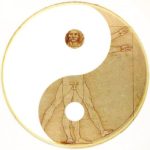
Ultimately our true level of physics is not measured by our expertise in some small aspect of existence but rather our ability to act in harmony with the universal forces that sustain humanity long term.
English Use of the “Physics” Symbol pre 15th C
The meaning associated with the “physics” symbol in the English culture has changed in critical ways in the past five hundred years. In particular the symbol has been demeaned in profound ways coinciding with the delusions of the English Combustion Revolution since the 17th century.
See full quotes from Online Etymology below.
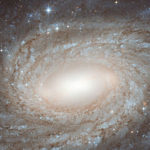 Observe the Proto-Indo-European associations of the “physics” symbol are bheue- “to be exist, grow” (see be) while the “nature” symbol arises from nasci “to be born,” from PIE root *gene- “give birth, beget.” This use of these symbols reminds us we are an intimate part of a universal state of continuous active creation.
Observe the Proto-Indo-European associations of the “physics” symbol are bheue- “to be exist, grow” (see be) while the “nature” symbol arises from nasci “to be born,” from PIE root *gene- “give birth, beget.” This use of these symbols reminds us we are an intimate part of a universal state of continuous active creation.
Observe how this active universal state is still being evoked in us millennia later in the the 13th Century. The “physics” symbol is associated with “natural science, art of healing”, directly from “study of nature” while the “nature” symbol is associated with “being, principle of life; character, essence,” from Latin natura “course of things; natural character, constitution, quality; the universe”
In other words, the symbols remain inclusive and remind us in the vast variety of the universe. They reflect and retain considerable universal potential, which means they tend to generate true hope.
English Use of the “Physics” Symbol post 16th C

By the 18th Century it is clear an epic change in consciousness has occurred in the English culture in the previous two centuries. This coincides with the emergence of two extraordinary, unprecedented phenomena: the Combustion Revolution and the global English Empire. The use of the English language becomes far more ego-driven i.e. dualistic and divorced from reality. Denial of the grand principles of energy becomes rampant, so much so that even the “physics”, “nature” and “science” symbols are stripped of most of their sustaining potential:
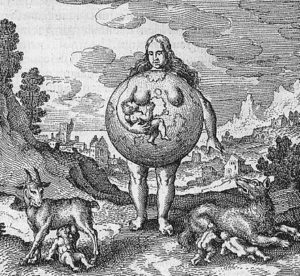
– “nature”
The symbol becomes personified, as in Mother Nature . This use still retains reminders of the human’s fundamental interconnection with all. However the individual psyche is now distanced from the universal reality by an intermediary “being”.
The complete denial of the our role as stewards amidst the universal flux occurs after the 1660’s when nature is specified as the “material world beyond human civilization or society”.
This dualism becomes even more manifest after 1874 with nature and nurture being contrasted being contrasted with each other. This denies the paradox that nature and nurture are of each other.
The emergence of the modern Environmental Movement in the 1950s further compounds this hopeless dualism. Nature has become conflated with “environment” and now this symbol is conflated with “ecology”.
– “environment”
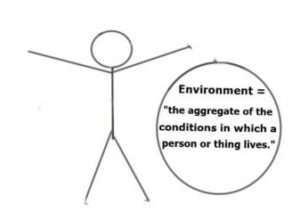 This symbol emerges c 1600 to express the “state of being environed” and then in 1827 it is associated with “the aggregate of the conditions in which a person or thing lives.”
This symbol emerges c 1600 to express the “state of being environed” and then in 1827 it is associated with “the aggregate of the conditions in which a person or thing lives.”
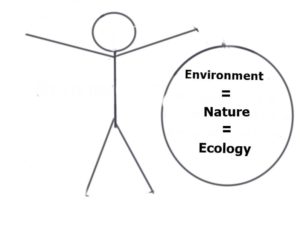 This divorce of living things from the universal flux is further compounded in the 1950s with the divorce of the human psyche from other sentient beings. All living things other than human beings are characterized as “nature”which is conflated in 1956 with ecology. Thus dualistic notions prevail in contemporary English, such as “Humans and the Environment” and “Commissioners for The Environment”.
This divorce of living things from the universal flux is further compounded in the 1950s with the divorce of the human psyche from other sentient beings. All living things other than human beings are characterized as “nature”which is conflated in 1956 with ecology. Thus dualistic notions prevail in contemporary English, such as “Humans and the Environment” and “Commissioners for The Environment”.
This completely denies the principles of physics, which remind us that we are 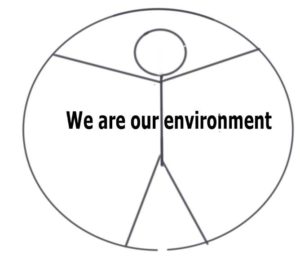 our environment. Existence involves paradox
our environment. Existence involves paradox
– “science”
The symbol was associated with “knowledge, learning, application; corpus of human knowledge” prior to the 14th C.
Science was also known as “natural philosophy”, which has the implication that science is a profound moral state of being – the loving of the wisdom of the universe.
Then the use of the “science” symbol began to become very ego-driven. Denial of our role as stewards amidst the universal flux became prevalent.
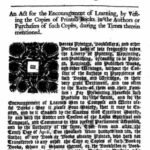
Knowing ceased to be a vital, moral state of being while knowledge was demeaned to be just an adjunct to daily life, a copyrighted commodity. The “science” symbol began to be associated merely with “book-learning,” also “a particular branch of knowledge or of learning;” also “skillfulness, cleverness; craftiness.”
The severance of psyche and physics deepened after 1715 when physics was defined as the “science treating of properties of matter and energy”. Physics became just a subset of science.
The separation of psyche and physics became almost complete from 1725 with the adoption of modern, extremely restricted sense of science: a “body of regular or methodical observations or propositions concerning a particular subject or speculation”.
Initially this was called philosophy but this was soon demeaned. Now it is defined as a narrow way of thinking.
Put simply, science is now just an amoral body of knowledge formed by a narrow thought process, the domain of an elite called scientists.
This is very convenient for the ego because knowledge and the technology arising from it can now employed without moral consideration.
“physics”
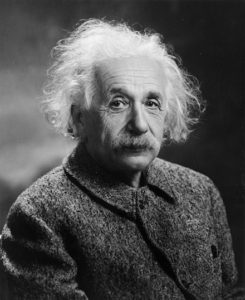
There is a common factor in the recent etymology of these prime words: they have all been stripped of their associations with compassion. Physics, which was once associated with healing and being at one with the processes of the universe, is now demeaned so that it is now just associated with a rarefied category of knowledge in the science catalogue, the domain of a tiny subset of “scientists” who are called “physicists”.
It is the product of a narrow way of thinking and the thought process is incapable of comprehending, embracing and transcending paradox, which is the nature of the universal reality. Without compassion, our modern English use of the “physics” symbol confines us in paradox, generating ever more lethal delusions and misery. Our use of knowledge becomes increasingly ego-driven and we become trapped in a spiral of self-destruction. Delusive hope prevails.
In ancient times natura meant birth, which shares meaning with the Sanskrit bhrtih “a bringing, maintenance.” Physics of true hope enable us to sustain our optimal place in the universal process of continuous renewal and passing. We are liberated to experience wondrous potential.
Related Pages
Nature of Hope
Pages to come
Great Principles of Physics
Physics of Compassion
Physics of Information
The Nature of Energy
All Things are Balance
Trace Theory
Physics of Paradox
Online Etymology http://www.etymonline.com/index.php?term=physic
physic (n.) Look up physic at Dictionary.com c.1300, fysike, “art of healing, medical science,” also “natural science” (c.1300), from Old French fisike “natural science, art of healing” (12c.) and directly from Latin physica (fem. singular of physicus) “study of nature,” from Greek physike (episteme) “(knowledge) of nature,” from fem. of physikos “pertaining to nature,” from physis “nature,” from phyein “to bring forth, produce, make to grow” (related to phyton “growth, plant,” phyle “tribe, race,” phyma “a growth, tumor”) from PIE root *bheue- “to be exist, grow” (see be). Spelling with ph- attested from late 14c. (see ph). As a noun, “medicine that acts as a laxative,” 1610s. The verb meaning “to dose with medicine” is attested from late 14c.
physics (n.) Look up physics at Dictionary.com1580s, “natural science,” from physic in sense of “natural science.” Also see -ics. Based on Latin physica (neuter plural), from Greek ta physika, literally “the natural things,” name of Aristotle’s treatise on nature. Specific sense of “science treating of properties of matter and energy” is from 1715.
nature (n.) http://www.etymonline.com/index.php?allowed_in_frame=0&search=nature
late 13c., “restorative powers of the body, bodily processes; powers of growth;” from Old French nature “nature, being, principle of life; character, essence,” from Latin natura “course of things; natural character, constitution, quality; the universe,” literally “birth,” from natus “born,” past participle of nasci “to be born,” from PIE root *gene- “give birth, beget.”
From late 14c. as “creation, the universe;” also “heredity, birth, hereditary circumstance; essential qualities, innate disposition” (as in human nature); “nature personified, Mother Nature.” Specifically as “material world beyond human civilization or society” from 1660s. Nature and nurture have been contrasted since 1874.
science (n.) http://www.etymonline.com/index.php?allowed_in_frame=0&search=science
mid-14c., “what is known, knowledge (of something) acquired by study; information;” also “assurance of knowledge, certitude, certainty,” from Old French science “knowledge, learning, application; corpus of human knowledge” (12c.), from Latin scientia “knowledge, a knowing; expertness,” from sciens (genitive scientis) “intelligent, skilled,” present participle of scire “to know,” probably originally “to separate one thing from another, to distinguish,” related to scindere “to cut, divide,” from PIE root *skei- “to cut, split” (source also of Greek skhizein “to split, rend, cleave,” Gothic skaidan, Old English sceadan “to divide, separate”).
From late 14c. in English as “book-learning,” also “a particular branch of knowledge or of learning;” also “skillfulness, cleverness; craftiness.” From c. 1400 as “experiential knowledge;” also “a skill, handicraft; a trade.” From late 14c. as “collective human knowledge” (especially that gained by systematic observation, experiment, and reasoning). Modern (restricted) sense of “body of regular or methodical observations or propositions concerning a particular subject or speculation” is attested from 1725; in 17c.-18c. this concept commonly was called philosophy. Sense of “non-arts studies” is attested from 1670s.
environment (n.) http://www.etymonline.com/index.php?allowed_in_frame=0&search=environment
c. 1600, “state of being environed” (see environ (v.) + -ment); sense of “the aggregate of the conditions in which a person or thing lives” first recorded 1827 (used by Carlyle to render German Umgebung); specialized ecology sense first recorded 1956.
environmental (adj.)
1887, “environing, surrounding,” from environment + -al (1). Ecological sense by 1967. Related: Environmentally (1884).
surroundings (n.)
“environment,” 1857, plural verbal noun from surround (v.).
environmentalism (n.)
1923, as a psychological theory (in the nature vs. nurture debate), from environmental + -ism. The ecological sense is from 1972. Related: Environmentalist (n.), 1916 in the psychological sense, 1970 in the ecological sense.
Last edit 11 Oct 1017
